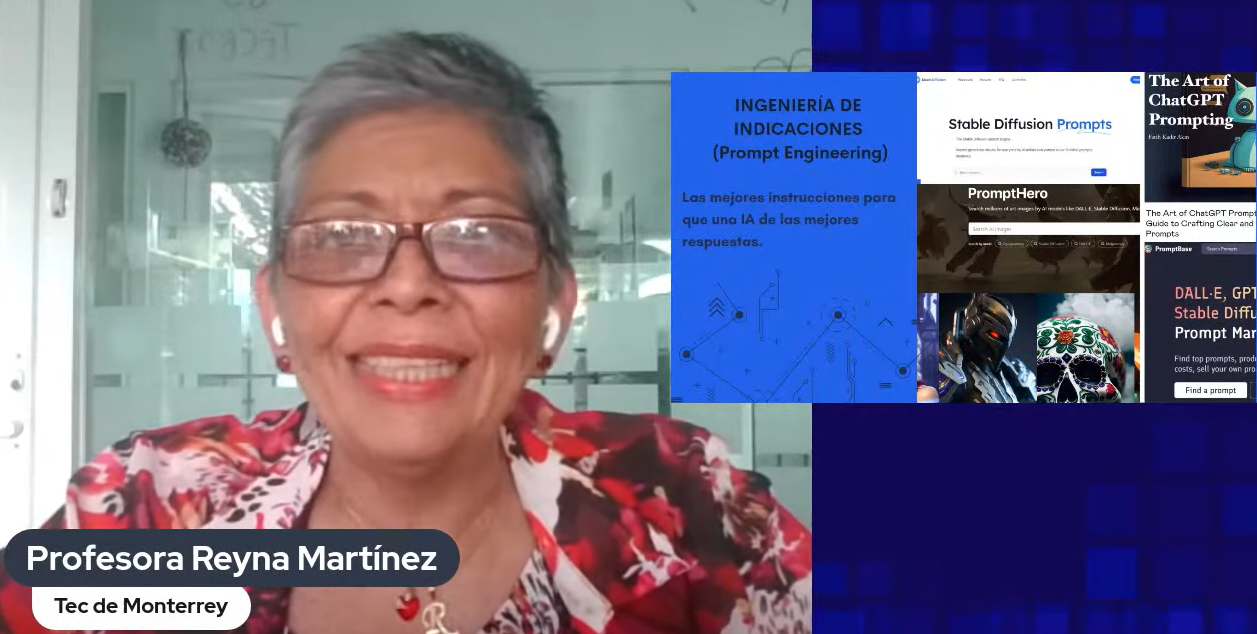Teachers and academic leaders must widely explore new artificial intelligence (AI) technologies to know what they do and how they work and define the best way to integrate them into their teaching. Professors Reyna Martínez and Selene Valdespino explained this in our webinar provided by the Observatory of the Institute for the Future of Education at Tecnologico de Monterrey.
This article summarizes the webinar covering artificial intelligence tools and solutions you can explore and integrate into your class. You can also find the most relevant tips and ideas that professors Reyna and Selene shared with us in this session. If you did not have the opportunity to attend the webinar live, you can watch the recording and share it with your colleagues. It contains much information for reflecting on current teaching practices that will transform and evolve faster than we think.
“The mission of artificial intelligence should always be to enhance human beings, to accompany them and make the tasks they perform daily more pleasant.” – Reyna Martinez.
The emergence of AI tools such as ChatGPT at the end of 2022 has provoked diverse reactions, including surprise, euphoria, disbelief, fear, and even prohibition in some educational institutions. However, Professor Martínez shared that in education, we will be surprised to find that technologies with artificial intelligence can become our best allies in teaching by assisting us with creativity so that we can better use our content creation time more effectively to generate personalized and compelling learning experiences.
Ethics in using artificial intelligence in education
In this session, our speakers shared that teachers and academic leaders need to dialogue and debate how to use artificial intelligence platforms in academia to generate more convenient agreements and strategies for education. Also, the current regulations about academic integrity in educational institutions should be reviewed, if necessary, for a new definition of plagiarism and copying. They also mentioned that we must reassess the teaching-learning process. According to Professor Martinez, we should work on competency-based education and assessment, emphasizing the process rather than the result.
Ethics in artificial intelligence is another very relevant issue, so, as teachers, we must encourage and dialogue with our students about it. In this regard, it is important to remind students of the following:
- Artificial intelligence solutions are just tools for students learning.
- These tools are not designed to do students’ tasks; that would affect and compromise their competencies.
- They should know the correct use of artificial intelligence inside and outside the classroom.
- Use artificial intelligence to help others, not against them; always apply critical thinking.
- Let students know that this artificial intelligence can be their educational assistant if used correctly.
- Initiate ethical debates on artificial intelligence as soon as possible.
In 2021, UNESCO published a document proposing seven ethical and social responsibility axes to guide the development and implementation of AI. In the webinar, Professor Martinez invited us to read this document to be more informed and prepared. She also urged educational institutions to address the value of ethics in using artificial intelligence. The seven axes are:
- The University
- Justice and equity
- Transparency
- Inclusion
- Responsibility
- Privacy and security
- The International Corporation
Tools with artificial intelligence will continue to evolve, and we must know and adapt them to improve our teaching, strengthen critical thinking in our students, and deepen ethical values in their learning.
“As teachers, we must know how to generate the best prompts in our classes and teach our students to use artificial intelligence well.” – Reyna Martinez.
Artificial Intelligence Tools for Learning
Open AI’s ChatGPT is not the only AI-based tool. Other companies are also developing AI solutions, including:
- Microsoft (Bing/Chat)
- Open AI (ChatGPT/Dall-E Chat)
- Google (Chrome/Bard)
- LAION Open Source Community
- Amazon (Amazon AI)
- IBM (IBM Watson)
- Goal (LlaMA)
- Baidu (Baidu Research AI Group)
- Alibaba (Alibaba DAMO Academy)
- Intel (Intel AI)
- NVIDIA (NVIDIA Deep Learning AI)
Artificial intelligence works from a text instruction called a Prompt. There is even talk about the importance of designing an engineering career with AI indications (Prompt Engineering). As teachers, we must know how to generate the best class prompts and teach our students to use artificial intelligence well. Below are some programs or solutions based on artificial intelligence that can help us with class activities:
- Text: ChatGPT, Jasper, Article Forge, Anyword
- Images: Stable Diffusion, Mid Journey, DALL-E, Starryai, Simplified
- Voice: Synthesys, Speechelo, Murf, LOvo, Synthe susa
- Video: Pictory, In Video, Lumen5
- Games: Unity, Unreal Engine, GameMaker
Artificial intelligence is already part of our lives, and we must shape it positively in education and our daily lives. The rapid evolution of AI requires us to react quickly and assertively in the educational area.
Relive this webinar. If your native language is not Spanish, you can activate this article’s instant subtitled YouTube translation. To activate this option, on YouTube, select the option “Subtitles” (the subtitles will appear in Spanish), and then select Settings ->Subtitles -> Translate automatically, and choose the language you prefer.
Translation by Daniel Wetta
This article from Observatory of the Institute for the Future of Education may be shared under the terms of the license CC BY-NC-SA 4.0 
)
)


)